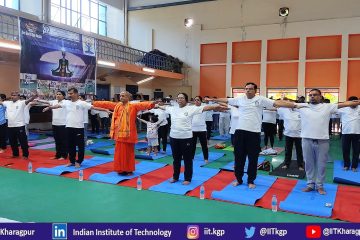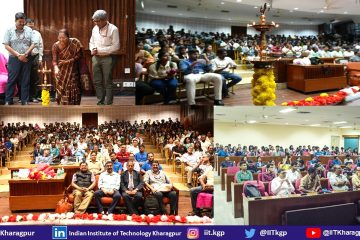
India Today Careers360 Jagran Josh
Many of India’s villages may witness a sea change in water quality, management and distribution when the ideation of five projects that evolved out of a joint workshop between IIT Kharagpur and the University of Edinburgh (UoE) on Rural Water Quality and Management bear fruit. The workshop held at IIT Kharagpur during May 14-16 brought together scientists, engineers, social scientists, social workers as well as people from industry from India and abroad to brainstorm about an issue that is critical to promote socially inclusive development throughout the world. The workshop was funded by the Global Challenges Research Fund (GCRF) of UK which supports cutting-edge research that addresses the challenges faced by developing countries.
 The scope of these projects is huge as they will tap not only the interdisciplinary expertise of IIT Kharagpur and the UoE, as well as that of the other participants in the dialogue and eventually involve government officials, local institutions, and community-based organizations. But, this is also because many of these projects intend to scale up from the cluster of 20-24 villages as the first point of study, to a thousand villages or more.
The scope of these projects is huge as they will tap not only the interdisciplinary expertise of IIT Kharagpur and the UoE, as well as that of the other participants in the dialogue and eventually involve government officials, local institutions, and community-based organizations. But, this is also because many of these projects intend to scale up from the cluster of 20-24 villages as the first point of study, to a thousand villages or more.
Prof. Pulak Mishra of the Department of Humanities and Social Sciences, IIT Kharagpur, who coordinated the workshop on behalf of IIT Kharagpur said, “This joint international workshop aimed at stimulating new collaborative research projects in different aspects of water quality and management in rural areas, including the critical issues such as water treatment, wastewater management, water contamination, energy-water-food nexus, water and ecosystems, etc. Emphasis has also been given on understanding the potential role of policies, local level institutions and community based organizations in this regard.”
Prof. Kate Heal from the School of GeoSciences, UoE, is part of the project that focuses on “Improving the quality of life of rural communities by empowering them with skills and knowledge in water quality management”. “Good quality water is sometimes a lower priority below other issues,” she said. Her team will try to generate community awareness of water quality so as to create a demand for change from within the community. The team will also test different strategies for nudging behaviour change in the community to maintain the safe water option.

The other projects intend to create a “Smart village” by addressing the problems of water and sanitation, a digital data platform on rural water that would bring together all available information on water policies and facts, the use of ‘Natural-based solutions to water problems in rural India’, and to ‘Match water needs with water technologies’ through a portal that would facilitate data analytics. All the teams include not only researchers from the two organizing institutions but also those from potential partner institutions and organizations such as IISWBM, Kolkata, Presidency University, NALCO, Vidyasagar University, and non-profit organizations such as ATREE (Ashoka Trust for Research in Ecology and the Environment) and Arghyam.
One common perspective of all these projects is to take into account not only the local hydro-geology, the social and economic circumstances but also cultural practices. Several of these projects are looking at learning, using and perhaps upgrading traditional knowledge. “We are not going to the local community to tell them what to do but to share with them our ideas,” said Prof. Dimitri Mignard, School of Engineering, UoE.
 The workshop grew out of IIT Kharagpur’s ongoing collaboration with the UoE. Prof. Mishra of IIT Kharagpur participated in the Newton-Bhaba Workshop on Translating Clean Energy Research to Rural India organized by the UoE in collaboration with IISER Pune during 04-08 September 2017. The workshop brought together physical scientists, engineers and social scientists from both the UK and India to share expertise, develop new ideas and build new partnerships to tackle some of the challenges in the development of energy technologies in rural areas. Following participation in that workshop, Prof. Mishra’s collaboration with Prof. Neil Robertson, School of Chemistry, UoE continued. They have been working together to develop joint research proposals along with other faculty members of IIT Kharagpur. Besides, one research scholar from Edinburgh visited IIT Kharagpur recently to investigate rural water quality in India in association with Prof. B.C. Meikap of the Department of Chemical Engineering, IIT Kharagpur.
The workshop grew out of IIT Kharagpur’s ongoing collaboration with the UoE. Prof. Mishra of IIT Kharagpur participated in the Newton-Bhaba Workshop on Translating Clean Energy Research to Rural India organized by the UoE in collaboration with IISER Pune during 04-08 September 2017. The workshop brought together physical scientists, engineers and social scientists from both the UK and India to share expertise, develop new ideas and build new partnerships to tackle some of the challenges in the development of energy technologies in rural areas. Following participation in that workshop, Prof. Mishra’s collaboration with Prof. Neil Robertson, School of Chemistry, UoE continued. They have been working together to develop joint research proposals along with other faculty members of IIT Kharagpur. Besides, one research scholar from Edinburgh visited IIT Kharagpur recently to investigate rural water quality in India in association with Prof. B.C. Meikap of the Department of Chemical Engineering, IIT Kharagpur.
Prof. Robertson said, “IIT Kharagpur is a particularly important place in research regarding rural development. The setting of the Institute also provides an enormous opportunity of engagement with rural populations”. The workshop included field trips to the nearby villages. In one of them, IIT Kharagpur has set up a multi-filtered, UV treated water facility that the villagers run and manage.
 The workshop introduced the participants to the problem areas regarding rural water in India and the years of research and action undertaken by IIT Kharagpur in rural welfare through the talks delivered by the three plenary speakers – Prof. Binay K. Dutta or the School of Environmental Science and Engineering, Prof. Manas K. Mandal of the Department of Humanities and Social Sciences, and Prof. Shirshendu De, Department of Chemical Engineering, IIT Kharagpur. Prof. De’s laterite based low-cost arsenic removal technology has won a societal award from the National Research Development Corporation and has been widely implemented in households and schools in Murshidabad, Malda, Midnapore, South and North 24 Parganas.
The workshop introduced the participants to the problem areas regarding rural water in India and the years of research and action undertaken by IIT Kharagpur in rural welfare through the talks delivered by the three plenary speakers – Prof. Binay K. Dutta or the School of Environmental Science and Engineering, Prof. Manas K. Mandal of the Department of Humanities and Social Sciences, and Prof. Shirshendu De, Department of Chemical Engineering, IIT Kharagpur. Prof. De’s laterite based low-cost arsenic removal technology has won a societal award from the National Research Development Corporation and has been widely implemented in households and schools in Murshidabad, Malda, Midnapore, South and North 24 Parganas.
“Through this workshop we tried to network and develop rural water related multi-disciplinary projects in collaboration with the University of Edinburgh, industry, NGOs and other stakeholders. These will go a long way in solving the critical issue of drinking water in rural India if funding agencies join hands with IITKGP and UoE,” said Prof. Meikap, who has been part of the organizing committee of the workshop. The Deputy Director, IIT Kharagpur, Prof. Sriman Kumar Bhattacharyya, delivered the inaugural address at the workshop.
 Signing off after a gruelling three days of the workshop, where the moderator, Dr. Sara Shilton, Head of Researcher Development, UoE, kept everyone on their toes, Prof. Robertson said, “We have to draw in every bit of human knowledge and practical sense to solve the huge problem of water. That is what we tried to do through this workshop. We wanted to develop mega conversations with many partners, but also individual connections that are integral to the process.”
Signing off after a gruelling three days of the workshop, where the moderator, Dr. Sara Shilton, Head of Researcher Development, UoE, kept everyone on their toes, Prof. Robertson said, “We have to draw in every bit of human knowledge and practical sense to solve the huge problem of water. That is what we tried to do through this workshop. We wanted to develop mega conversations with many partners, but also individual connections that are integral to the process.”
In the valedictory session, Prof. Partha Pratim Chakrabarti, Director, IIT Khargapur highlighted the ongoing mega projects at IIT Khargapur in different critical areas. He said, “This workshop is extremely important in developing research ideas for solving the problems related to bettering life in rural areas.”
Graphics : Suman Sutradhar



